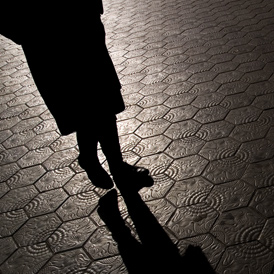Can a person disappear in modern Britain?
The UK Border Agency has lost track of 124,000 asylum seekers and migrant applicants. But how easy is it to disappear without a trace in modern Britain? Channel 4 News investigates.

Living off grid, undetected by the authorities, free from bureaucracy. Film character Jason Bourne tried it; many conspiracy theorists believe Lord Lucan managed it.
But can this happen in the real world, in modern Britain? Plugged into our mobile phones and scrutinised – according to police figures – up to 70 times a day on CCTV, can anyone actually disappear?
Yes, they can, says the UK Border Agency (UKBA), which tracks UK immigration. In fact, quite a lot of them can.
In the last year, the number of asylum and migrant applicants UKBA has lost track of has leapt from 18,000 to 124,000 – a figure equal to the population of Cambridge.
The lost cases are placed into UKBA’s euphemistically named “controlled archive”, which MPs have criticised as a “dumping ground for cases on which the agency has given up”.
It is quite easy to disappear if they have a mind to do so. Private investigator Neil Sheppard
But private investigator Neil Sheppard told Channel 4 News he had “sympathy” with the authorities, because while tracking someone born in Britain can be relatively easy, tracking foreign nationals can be much more complex.
“It is very difficult to disappear as the average person. All of our lives have data trails, from when you are born, to when you move house, your consumer records,” he said.
“But here we are talking about people who are off the system and may never have been on it. They may not have consumer records. If English is not their first language, there could be several spellings of their name, not on purpose. Any database is only as good as the input – so it’s quite easy to fall off the grid in various ways.”
Mr Sheppard, regional director for the Midlands region of Allied Detectives, said people who disappear don’t necessarily become homeless or destitute.
Read more: UK Border Agency 'dumped' cases of missing migrants
“I had a recent case – he was not an illegal immigrant but a guy came into the country and brought his wife. They had a child here, and then he disappeared. Through the grapevine I tracked him to a restaurant in Northampton, but there is no way on earth you would find a record that would put him there.
“If you live in a cash-in-hand world, you are not on the system, so it’s very difficult to track people down.”
He added: “I sympathise with the authorities, they get hit with a big stick by the public if they are not good enough. But for these kinds of people, it is quite easy to disappear if they have a mind to do so.”

How does UKBA lose track of people?
Asylum seekers and migrants have to attend regular meetings at immigration centres. They also receive letters from UKBA. If appointments are missed or letters ignored, a system is triggered where they are checked on up to 19 different databases – including things like their Oyster travel cards in London.
If they are not found, UKBA has powers to track them down in other ways, working with police.
But asylum experts told Channel 4 News there are still gaps to fall through. Many people are also frightened when their applications are turned down, the Refugee Council said.
Donna Covey, the organisation’s chief executive, said: “We know around a third of negative decisions are still overturned at appeal, meaning many initial decisions are wrong and people are facing being returned to countries where their lives are at risk.
“While the government has made some improvements to the system, there is still a lot more that could be done to support people from the beginning of the process.”
And sadly, the more a person is already living in difficult circumstances, the easier it may be to hide.
“A person living from hand to mouth has a much better chance of disappearing than you or I,” said private investigator Mr Sheppard.
The disappeared
And it is not just asylum seekers or migrants who get lost in the modern world. An estimated 250,000 people go missing each year, according to Home Office statistics.
The charity Missing People said that up to two-thirds of these people choose to go missing. While the majority of cases are found quickly, this still shows that it is possible for all kinds of people to disappear, at least temporarily.
But the government believes that UKBA needs to put more effort into tracking its “lost cases”.
Keith Vaz, Labour chairman of the home affairs select committee, which produced the critical report of UKBA, told Channel 4 News UKBA had the powers to find asylum seekers who go missing, but was not using them in the right way.
“There are processes, but it is interesting that they are prepared to gather a lot of immigration officers and raid restaurants on a Friday night, finding one person or no people without the right immigration status. If they have the numbers to do that, they have certainly got the numbers to do the tracking, the detective work you need,” he said.
“You need to track people from the very, very beginning. When they make an application, that’s when you lock down the information and track them from there.”




